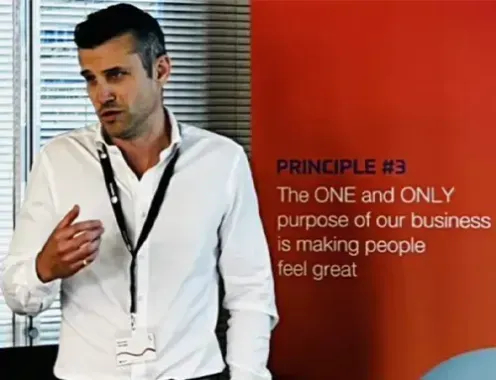
How to Work from Home Successfully
As 2020 came to an end, a lot of us reflected on what last year meant to us, especially working from home.
In March, when the majority of employees were asked to work from home, it was an exciting prospect. It gave us the flexibility that working from the office full-time couldn’t offer. We welcomed the idea of not having a commute and the luxury of being able to make your own lunch everyday with open arms.
However, as we look back on last year, there are definitely some things we want to change in 2021, in order to make our working from home environment even more productive and beneficial. One of the best things about being in the office is being able to see your co-workers.
Although we won’t be able to have office catch-ups in person for a while, planning virtual coffees has been one way of keeping in regular contact with our colleagues, where we can catch up on life outside of meetings!
This is one of the five things we want to change this year, so here are some tips for working from home that we're taking with us into the New Year:
- Pretend like you are going into the office – When working from home, try to prepare as if you were going into the office. Make a coffee, wear a nice outfit (try to avoid sweatpants!) and give yourself a chance to wake up before logging on.
- Structure your day like you are in the office – At home, you are your own manager. Make sure to segment your tasks over the course of the day, to avoid getting burned out or losing focus.
- Get some fresh air – Weather permitting, it’s important to try and get out if you can. Even if it’s a quick walk around the block!
- Work when you’re most productive – It’s natural for your motivation to rise and fall throughout the day. Make sure you understand your working pattern to capitalise on your most productive periods.
- Stay connected – Video calls are a great way to break up the day and keep in touch with your colleagues.
If you have any other tips for working from home successfully, let us know by contacting Neil Cope at [email protected]

WFO, WFH - Where Next?
There's no doubt that 2020 was an unusual year in many ways. In the professional sphere, one of the most significant has been 'The Great Work From Home Experiment’.
For many years, despite the tools and technologies being readily available, many corporate cultures viewed working from home as code for 'Netflix & Chill’. The past year has surely demonstrated that, for most office/computer-based workers, if anything, the opposite applies.
People consistently tell us that their working day has expanded to include their prior commuting time and that, for the majority, their days are longer - accommodating colleagues and video calls across multiple timezones.
Interestingly, people for whom it is an option have also told us how much they have enjoyed the social elements of the occasional day in the office - to the extent that they often feel as if they get less work done while they are there!
We have also identified a third group, who have optimised their use of technology by relocating their WFH to cabins in the mountains - or even entirely different countries!
For us, the big question is this - what happens next?
At some point this year, we hope to return to a situation where groups can congregate more safely and so we are curious to see how corporates respond - whether their suspicion of WFH returns, whether they close offices entirely or look for some sort of meeting-hub hybrid.
Equally, we are also seeing a distinct shift with candidates, who have a far greater expectation of location flexibility than ever before.
Finally, as always, there is the caveat of too much of a good thing - if teams demonstrate that they can collaborate effectively in a distributed manner anywhere in the world, then what is the benefit for a company to continue to employ those teams in a high-cost location?

We're Working to Bridge the Gap between Humans and Machines
EMEA Recruitment is proud to be working in collaboration with St. Gallen University’s Institute of Cognitive Automation to bridge the gap between humans and machines.
This research intervention is working with project leaders across Switzerland’s leading businesses, who want to help close the gap between automation and human augmentation.
We know that 70% of digital transformations within businesses fail, but the failure rate has actually increased with technology. St. Gallen University has found that 85% of Data Science projects add no value to a business.
We know that the Future of Work is not solved by one company. Therefore, St. Gallen University’s Cognitive Automation Institute has worked with us to find companies who want to optimise human augmentation.
Project leaders from these businesses are now participating in research to find out where and how they’re going wrong.
The project is broken down into two phases:
Phase 1: Structured Interviews
All participants will receive the critical human and machine teaming design criterion, using a method of inquiry to identify the design challenges in cognitive automation.
Phase 2: Empirical Study
For selected companies, a human and machine solution that addresses the criterion would be defined at a pragmatic level, e.g. process level or judgment level. To impact the company on the criterion identified.
We are delighted to be collaborating with St. Gallen University’s Dr. Chantelle Brandt Larsen on this research.
We look forward to supporting the Institute of Cognitive Automation and our partner businesses throughout this research project, and to working towards a human and machine solution to change the Future of Work.
You can read more about our ongoing partnerships here: https://www.emearecruitment.com/partnerships
If there is anything you’d like to discuss with us or for more information, please contact Mark Robinson in our Swiss recruitment team.

Working in the Office vs. from Home: What's the Best Mix?
Many of us had to adapt to working from home during the COVID-19 pandemic, but what mix of home working and working in the office would we prefer?
Employees were advised to work from home where possible from March 2020 onwards in both Switzerland and the Netherlands, as the pandemic took hold in Europe.
Although flexible working was already quite common across Europe prior to COVID-19 restrictions, remote work has still been a new phenomenon for many office workers. But do we actually prefer working from home, or have we missed working from the office?
The pandemic will have given many employers and employees the opportunity to consider home working for the first time. Moving forwards, some workers may feel that they prefer working from home, and could try to split their working hours between the office and home. Some may never want to return to the office at all.
At EMEA Recruitment, we wanted to hear from our network across Switzerland and the Netherlands, to determine how many days people prefer working in the office versus working from home.
The results may be interesting to managers, particularly in the Human Resources sector, considering how to integrate remote working in the future.
On LinkedIn, we ran a poll for one week from 21st -28th October. We had a total of 1,364 votes on the survey, which asked respondents to vote for their ideal mix of office work/working from home.
The poll revealed a staggering preference for working one to two days from home, with the remaining days in the office. This option won 47% of the vote, with 642 professionals choosing this mix.
The second most popular choice highlighted a clear preference for remote working, with 38% of respondents (or 524 people) opting for working three to four days from home.
In fact, working from home five days per week was the preferred option for 10% of people (130), indicating that the days of full-time office work may be behind us. Just 5% of professionals (68) said they would like to work in the office five days a week.
Although many of us would like to be in the office most of the time, companies should be aware of how many professionals feel that working from home is beneficial to them in some way. Perhaps the changes brought about by the pandemic could enforce more flexible working conditions for office workers moving forwards, in line with their clear preferences.
We would be interested to hear from HR leaders who are navigating the changing world of work on your plans for the future. If you based in Switzerland, please contact Keely Straw or if you are in the Netherlands, contact Katie Insley.

Latest EMEA Webinar: How to Get A Career You Love and Negotiate the Heck Out of It - Wies Bratby
The inspirational fight for women’s equality during the last century has resulted in equality between men and women in the workplace being a closer reality than ever before. However, there’s still work to be done. All too often, high-achieving women are too afraid to ask for what they want, need and deserve in case of rejection, judgement or a negative impact on relationships with their colleagues or clients. However, this does not have to be the case!
In May, we welcomed Wies Bratby to the EMEA Recruitment Podcast with our founder, Paul Toms. In the podcast, Wies outlined how it is her life mission to help women negotiate their worth, and gave an overview of her current programme, Women In Negotiation (WIN). Wies’ longterm passion for negotiation led her to begin her career as a lawyer in the Netherlands, before moving on to become a HR Director, setting up human resources across the globe. Upon moving to Switzerland, Wies recognised that women around the world were struggling to find their dream jobs and negotiate fitting salaries for their hard work.
As a result, she launched WIN, which helps women across the world realise their worth, communicate it and get them the positions and salaries they want. WIN is consistently successful, with an average salary increase of 49.1% for promotions or new roles.
Following on from the inspirational podcast, on Friday, 5th June, EMEA once again partnered with Wies to host her ‘How to Get A Career You Love and Negotiate the Heck Out of It’ webinar session with a multitude of women from our Swiss network.
In the webinar, Wies shared tips and insights into how our guests could transform their careers by finding their dream ‘unicorn’ job and negotiating a salary which truly reflects their hard work. Primarily, the workshop explained in depth 5 key pieces of advice that any woman should take on board in order to find a job that they truly love.
- View the current pandemic crisis as an opportunity
- Raise your expectations
- Being a woman is an advantage
- Don’t focus on getting the job
- Invest in training
EMEA Recruitment would like to place on record our thanks to Wies Bratby for hosting a fantastic, empowering workshop, and if you’re interested in finding out more about how Women In Negotiation can help you, follow this link.
If you have any ideas of further virtual workshops or events you’d like to see us run in future, don’t hesitate to contact Paul Toms or any of our consultants through our Meet The Team page.
Want to read more content relating to women in the workplace?
In early March, we posted a series of posts celebrating International Women’s Day 2020. These included a summary of the events and activities EMEA have carried out to support women’s equality and a roundtable discussion between our Managing Director, Richard Bailey, and 3 of our senior consultants, who shared their experiences regarding attitudes towards women in the workplace.

Top 7 Benefits of Working From Home
As the Coronavirus pandemic continues to spread across the world, millions of businesses are being forced to adapt to managing a completely remote workforce. We know that for most of us, this is a highly concerning time, and for some it may be a particularly anxious period, which we talked about in a blog post earlier this week. However, with home-working being brought to the forefront en masse, it’s the perfect time to highlight the benefits that home working can bring to an employee’s working life.
Therefore, below, we’ve outlined 7 key personal benefits of remote working, and the tangible health benefits it provide.
Remember, it isn’t for everyone…
Before jumping into a list of the direct benefits of home working, it’s important to point out that it isn’t, and never will be for everyone. There isn’t a clear answer on whether working remotely increases employee productivity, or not. What makes a person more productive and produce better results differs from employee to employee, and is completely dependent upon their work-style and personality. It should be no surprise then, that academic studies are unable to categorically say that home-working increases productivity across the board. We’re all different, and for some there is nothing worse than trying to work whilst surrounded by home comforts, whereas others may thrive in an environment free of office distractions and background noise.
Fundamentally, sometimes the grass is always greener on the other side. When you’re sat in the office, the chances are that you could think of nothing better than being sat in your cozy living room with your pets. However, when you finally get the opportunity to do so, you might miss the office and your colleagues and hate working from your living room. It’s all about finding the balance which works for you.
Top 7 Benefits of Working Remotely
1. Flexible Schedule
Answer that phone call, take the dog for a walk, take a break when you see fit and have your lunch when you want it. Working from home gives you the freedom to manage your own schedule with office hours having less of an impact on it. If you’re not constrained to office hours, the freedom is completely yours to choose when to complete your work. Even if you do work office hours, if you have a 10 minute break in between calls, you can spend your time not working doing something valuable; get some exercise, play a song on your guitar, sit outside and get some daylight. These are things especially valuable to your mental health during this current isolation period.
2. No commuting
Nobody enjoys commuting to work everyday. Some of us spend hours each day travelling to and from work. Working remotely cuts this out, giving you ample free time to spend not thinking about your work, saving money on fuel and public transport and cutting your carbon footprint. You’re not only saving time and money, but also the environment!
3. No office distractions
We know some people thrive in the office environment, but it can sometimes be all too easy for some of us to spend half of your day listening to office chatter, staring at the bustling city outside your office window and getting involved in office politics. At home, you’re free to isolate yourself and place your entire focus onto the day’s work, as you see fit.
4. Your own custom environment
At home, you’re in control of your own environment. Set your own noise level, be that working in complete silence, switching on nature sounds, listening to office bustle or even sing along to your favourite songs. Choose exactly where you set up your office. It doesn’t have to be a large desk in your living room or in your study. You can set up your office on your sofa or even work in the garden. The choice is completely up to you to find the environment which increases your productivity the most and best suits your lifestyle.
5. Complete household tasks usually reserved for the weekend
While working in the office everyday during the week, we often don’t get the chance to tidy the whole house, wash the ever-growing mountain of laundry in your basket and mow the garden until the weekend comes. Working from home gives you the chance to complete these tasks during your breaks, meaning the weekend can be reserved for you to spend more valuable time doing the things that you enjoy; just how it should be spent.
6. More time with the people you value the most
Of course, working from home can bring you closer to those you love. This is especially true during the current situation, where children across the world are off school and your significant other or housemates may be working from home too. Even in more ordinary times, you don’t have to send your children to after-school clubs because you’re at home already, you can spend time with your pets rather than leaving them alone during the day, or even just spend more time to yourself.
7. Communicate more effectively with colleagues and Value time with them more
Working from home doesn’t have to be the stereotypically isolated and lonely situation it once was. Modern technology has changed it significantly. It’s so easy to organise a virtual meeting, and because you know you can’t just walk over to your colleague’s desk to ask a question, but have to actually place some thought into a virtual meeting, you will refine your thoughts and communicate more effectively. Furthermore, the contact you have with your colleagues while working remotely can sometimes be more fun thanks to modern technology, even outside of work hours. During the COVID-19 isolation period, EMEA Recruitment have had beer meetings, virtual pyjama parties, and daily catchup calls through our virtual meeting room software EMEA Live.
Health Benefits
Ultimately, perhaps the greatest argument in favour of working from home is the benefits it can have on your physical and mental wellbeing. Commuting to work everyday is not only frustrating, but research has found it is actively shortening our lifespans. Uncomfortable temperatures, anti-social behaviour, overcrowding and journey delays due to high traffic have been found to be the biggest contributors to stress caused by commuting. On top of this, commuters eat approximately 767 calories more on average outside of meals per week as a result of their travel times. Working without the commute allows people to cook healthier foods at home, snack less and feel less stressed.
It isn’t just the commute, either. All of the benefits outlined above contribute to a less stressful and healthier life for workers. The more balanced schedule that home-working gives us allows more time and money to do things that enrich our physical and mental wellbeing, perhaps leading to a longer and more healthy life.
The future of remote working
Prior to the current coronavirus outbreak, remote working was already an increasing trend, with it being projected that 1 in 3 workers will be able to work from home by 2022. Of course, the current crisis has pushed home-working into the forefront on a mass scale. Of course, this isn’t an accurate representation of what a future with a higher amount of home-working will look like, and a mix of both approaches to work will most likely prevail. However, we may see more employers in the future look back at this period and look at remote working with a more positive mindset.
Of course, it will never be for everybody, but for some people it may be the difference needed to produce a more productive, less stressful work-life, and therefore as the work environment continues to evolve, the tangible benefits of remote working will most likely continue to become more relevant.
Keep up to date with our progress in working from home and all other things EMEA on our LinkedIn page, including our #MyWeekFromHome series of posts every Friday. Also, make sure to keep up to date on our News and Events pages for more updates in the coming weeks.

EMEA podcasts
The EMEA Recruitment podcast welcomes guests from across our network and beyond to share their career journeys, advice, and inspirational stories.
























You can also use your social account to sign in. First you need to:
Accept Terms & Conditions And Privacy Policy